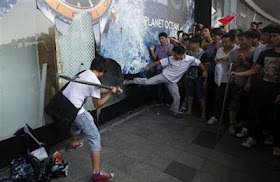Hence, it was with no small amount of displeasure that I noted the re-emergence of territorial disputes in Asia flaring up, especially in mainland China. While the politics of territorial disputes have until now been fairly contained, there has always been the danger of these tensions spilling over into economic disruptions. With tightly integrated production schedules alike "just in time" processes nowadays, such disruptions could easily affect the global availability of important consumer alike automobiles or consumer electronics if prolonged. The cause this time, though, does not involve an earthquake, a tsunami, or a torrential downpour but simple human insensibility.
These past few days have witnessed Chinese protests spilling over into outright hostility against Japanese foreign investment and investors--or factories and expatriate personnel alike. Left with few alternatives, many Japanese companies operating in China have closed offices and factories. The BBC reports on this across-the-board demolition derby prompting widespread Japanese closures that threaten $345B in bilateral trade between these two giants of the region:
- Panasonic - shut factory in Qingdao
- Canon - suspended operations at three plants
- Honda and Nissan - stopped production for two days
- Mazda - stopped production at Nanjing factory for four days
- Toyota - suspended some production
- Sony - closed two of its seven plants and is discouraging non-essential travel to China
- Seven & I Holdings - closed 13 supermarkets and 198 convenience stores
- Fast Retailing - shut 42 Uniqlo clothing stores and advised Japanese employees to stay at home
- Aeon - closed 30 out of 35 supermarkets
- Komatsu - the construction equipment maker has halted work at three plants in Shandong province
- Japan would do itself a lot of favours if it finally issued an apology to all the countries it rather savagely occupied during WWII. Germany did so long ago, and it is never too late for Japan to follow suit since Asians apparently have very long memories. The grievances extend practically everywhere--from China to South Korea and on to Southeast Asia--while the offences are undoubtedly grave--forcing women into prostitution, [subsequently American exploited] human experimentation, arbitrary torture and execution, etc.
- OTOH, the others--Chinese, Koreans and Southeast Asians in particular--ought to discourage obtaining cheap political points by distracting people from more significant matters. Unpopular at home? There is always the temptation to "blame Japan."
- Insofar as territorial disputes in Asia will not likely be solved through arbitration at bodies alike the International Court of Justice due to the reluctance of certain parties, the promise of much-needed fuel supplies in the East China Sea can be brought to fruition by joint exploration. Yes, there will be issues as to what each party will contribute and get in return, but such matters are comparatively trivial to the gains from exploiting these resources in the here and now and easing territorial disputes in the process.
UPDATE: Also see the Lowy Interpreter on the possible demise of "Factory Asia."

